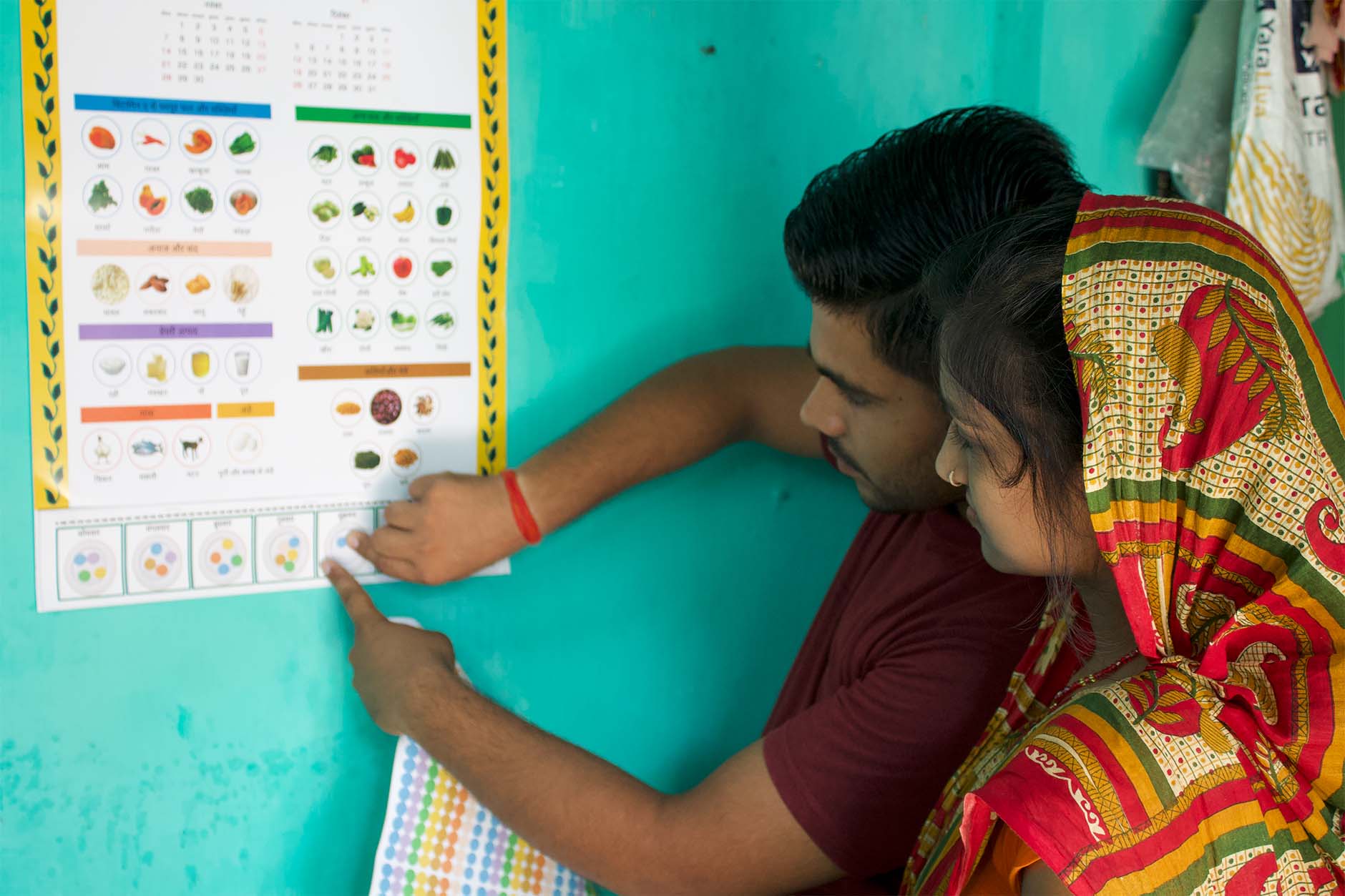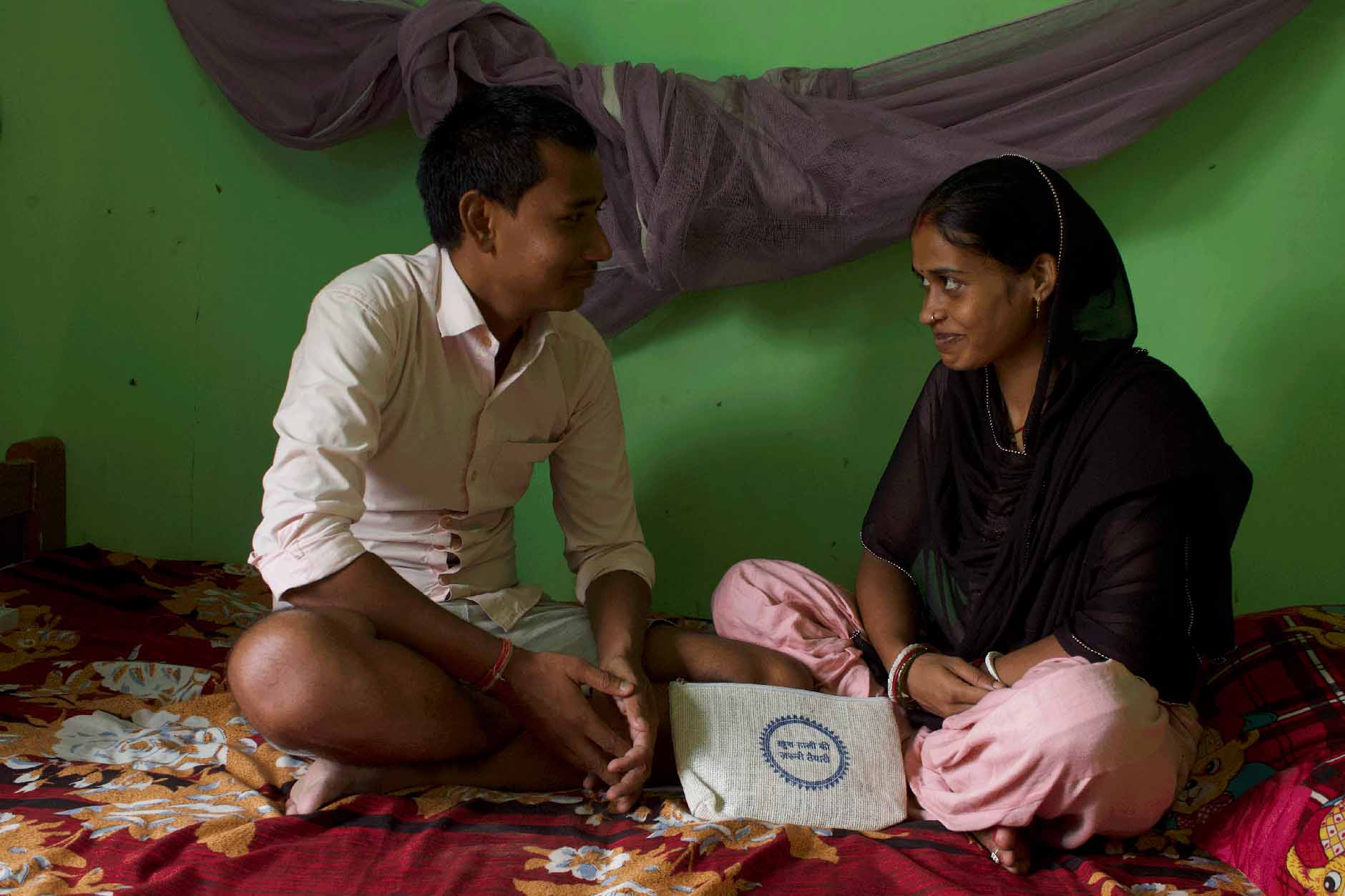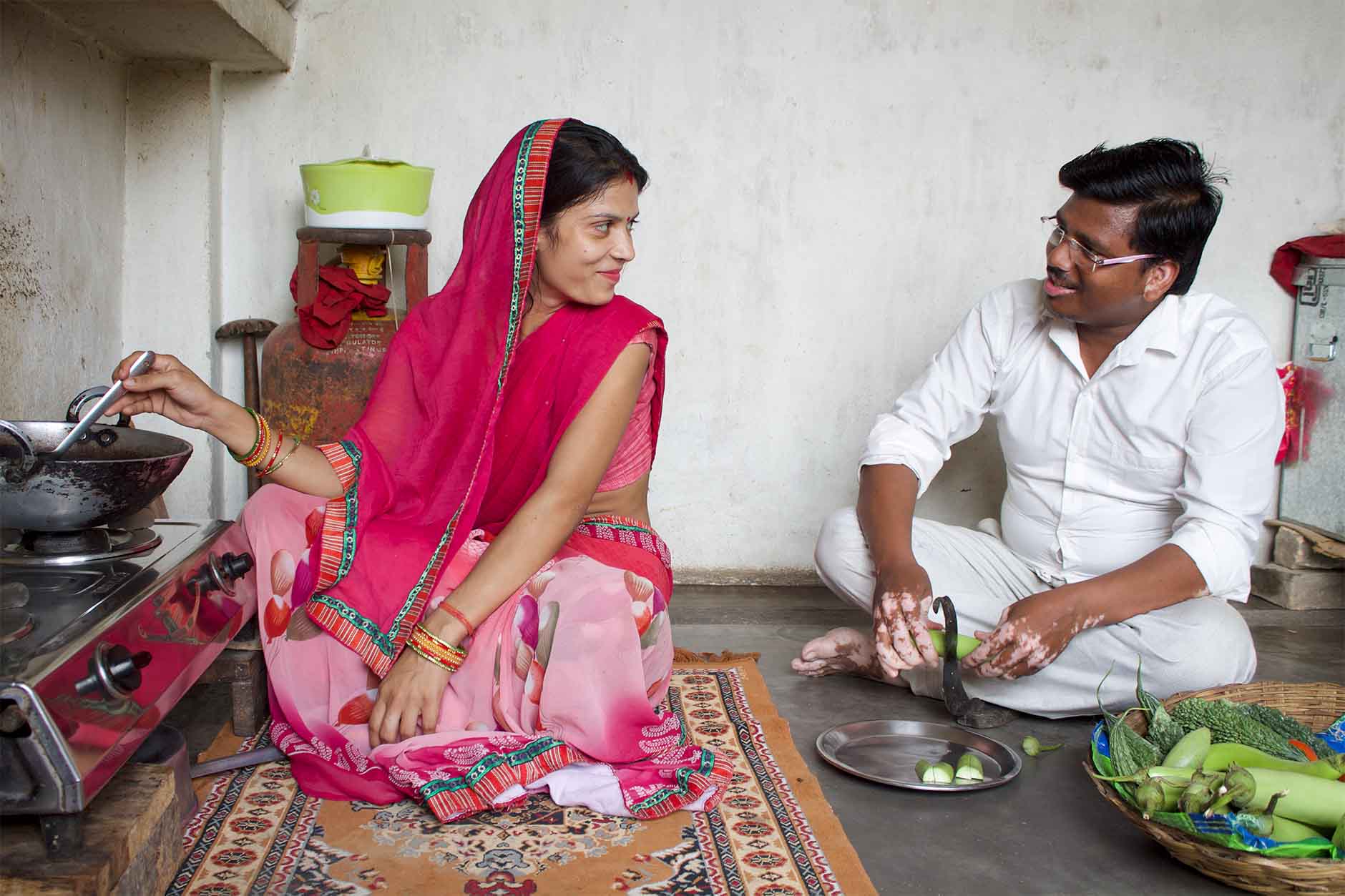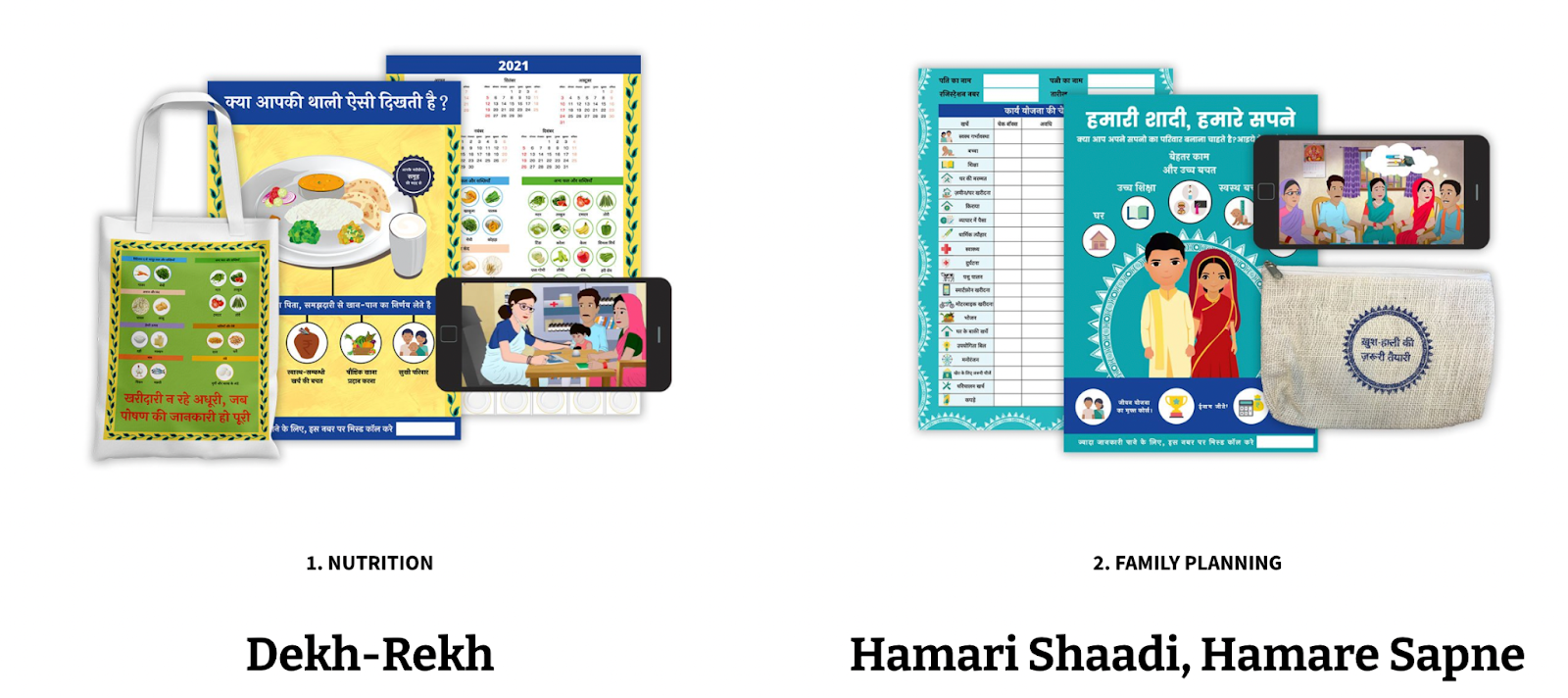Dalberg uses cookies and related technologies to improve the way the site functions. A cookie is a text file that is stored on your device. We use these text files for functionality such as to analyze our traffic or to personalize content. You can easily control how we use cookies on your device by adjusting the settings below, and you may also change those settings at any time by visiting our privacy policy page.
In rural parts of India’s Bihar state, two innovative community programs are drawing men closer into decision-making and actions related to family planning and nutrition. A new report illustrates how these pivotal programs – called Dekh-Rekh and Hamari Shaadi, Hamare Sapne – could be more broadly adopted, and what is behind their potential to scale.
Twenty-one-year-old Rashmi, her husband, Arjun, and their 18-month old son live in an extended household that includes Arjun’s parents and his two younger siblings. Until recently, Rashmi took on the majority of the household chores and childcare, but had no role in decisions related to nutrition and financial planning. Arjun does most of the shopping for the family, but when Rashmi was pregnant, he bought strength-building foods like nuts and Horlicks powder in secret to avoid family fights about extra food purchases. Rashmi had heard about these foods from the doctor and other women in the community.
Things started to change shortly after the birth of Rashmi and Arjun’s son, when the household was introduced to the nutrition-focused Dekh-Rekh program. Dekh-Rekh – meaning ‘Care and Nurture’ in Hindi – leads couples and their families towards making healthy food choices and purchases to feed their children.

Before coming into contact with Dekh-Rekh, household roles and expectations were rigidly defined and adhered to in Rashmi and Arjun’s household. Now, more open conversations about nutrition are the norm. Arjun has better tools for healthy food choices whenever he shops: “The program calendar is in my mind when I go to buy vegetables. We also used to spend Rs. 100 on our groceries, but now we are able to purchase a greater variety of vegetables for Rs. 60.”
In a nearby village, newly married, 18-year-old Kanchan had hoped to wait at least a year before having children. Others in the family – including her husband – felt differently. The couple was encouraged to start a family right away because “if you use modern contraceptives you may not be able to have children”.
Kanchan and her husband’s participation in Hamari Shaadi, Hamare Sapne, ‘Our Marriage, Our Dreams’ in Hindi, helped shift views in the household on when the couple should conceive. “These days we all discuss, and our mother and father say do as you feel right,” says Kanchan. “Our goal now is to make savings, and we want to have two children only, but if they are both daughters then we will have pressure from our parents to have three,” says her husband.
Hamari Shaadi, Hamare Sapne makes it possible for couples to avoid the usually awkward topic of family planning when addressing their aspirations. Instead of leading with talk of contraceptives, the conversation is about reaching financial goals. This shift allows couples to more comfortably discuss family planning and delaying, spacing, and limiting children.

Since viewing the program’s edutainment videos, Kanchan has also shifted her own future expectations from staying home to prepare food, to the possibility of working outside the home: “It will be good for the family, and even the children can be brought up well if two members are working.”
Fostering New Behaviors for Better Outcomes
Dekh-Rekh and Hamari Shaadi, Hamare Sapne are the culmination of a two-and-a-half-year journey for Dalberg in partnership with PCI India. Together, they undertook multiple phases of work to create features and behavioral ‘nudges’ that enable men to adopt behaviors that lead to better household nutrition and family planning. The work was funded by the Bill and Melinda Gates Foundation.
Using a strong visual focus and ‘gamification’, what differentiates Dekh-Rekh and Hamari Shaadi, Hamare Sapne is their solid foundation in financial planning as a gateway for knowledge-building and discussion. They help shift perceptions that healthy nutrition habits are rooted in affordability, and give couples and their families a platform to more openly discuss family planning. Programs are delivered in conversation with married couples from the same community. The slightly older couples serve as role models for younger couples, providing a model for how to connect with extended family members on sensitive topics.
Results from the pilots are substantive, and are fully detailed in the report, Engaging men for improved family planning and nutrition outcomes. In villages exposed to the programs, couples’ communication about child nutrition increased 24%. Men’s roles in feeding their children increased significantly, and their participation in procuring and preparing food increased when compared to comparison villages.

Family planning knowledge increased 33% for women and 31% for men relative to comparison villages, and young men and women in intervention villages ended the program with a greater openness towards family planning and contraceptives. One man described how he and his wife now have a better relationship as a result of their participation, saying, “We used to quarrel a lot, now we cooperate with each other. Earlier, we were only concerned about work but now along with work we also pay attention to our children’s diet.”
Until now, whatever programs have happened have not brought a husband and wife together like this. This is the first time.” — PCI Community Resource Person
How the Programs Came to Life
Historically the development sector has anchored family planning and nutrition programs around women, both as end-users and as providers. Many of these programs have seen considerable success in their outcomes, but challenges have emerged in the long-run related to the disproportionate load shouldered by women.
In India, the usage of modern contraceptives has progressed, but the gap to engage men in the process is widening, putting an even higher burden on women. Women are responsible for 90.2% of modern contraceptive usage, of which 67% is female sterilization. Existing programs often reinforce imbalanced gender norms related to care work and time poverty, and there is a sense that men have been alienated from the ‘female’ domains of family planning and nutrition.
With an increase in men’s engagement, evidence shows positive improvements in health, nutrition, and gender outcomes, but falls short of showing lasting behavior change at scale. This is where PCI India and Dalberg, with support from the Bill and Melinda Gates Foundation, stepped in to address the question: How might we engage men in nutrition and family planning through innovative and gender transformative programs in rural Bihar?
Dalberg consulted with couples, their families, and other stakeholders across the ecosystem, including public health experts and other organizations working in the sector, to uncover their needs, behaviors and aspirations, understand their reactions to early ideas, and generate nuanced insights.
Beginning shortly before the outbreak of Covid-19, programs were developed and tested over two-and-a-half years and six phases. Dalberg and PCI India used an interdisciplinary approach anchored on human-centered design research and behavioral science, supported by a literature review, expert interviews, rapid prototype testing, and a learning pilot phase where the full programs were piloted and assessed with almost 2,000 couples participating.
The pandemic shaped the prototyping and learning pilot phases in critical ways, prompting the adoption of hybrid remote and in-person research. During these phases, Dalberg worked with community resource representatives to prototype and pilot the programs and gather nuanced learnings from their program delivery experience.
Key Insights That Influenced the Development of Dekh-Rekh and Hamari Shaadi, Hamare Sapne
In communities where several generations occupy a home, food and family planning are decisions for the household, and household roles tend to be strictly divided. While older family members can influence young couples’ choices, Dalberg found that older family members are generally amenable to change, particularly when they can see how family planning and food choices relate to financial goals and improvements in children’s health.
According to an elderly member of a participating household, “In my time, nobody was there to explain planning and budgeting to us, like how to be financially strong and then plan for a family, which is why we had children so early and couldn’t save much. I will make sure not to put pressure on my daughter-in-law to have children early, just after marriage.”
Through this program we became aware that male involvement is also necessary to take care of the children. My son now takes care of the child. He has stopped roaming here and there and has become more responsible.” — Father/father-in-law of a participating couple
Women are typically the primary recipients of information around nutrition and are also in charge of food preparation and feeding. But their awareness does not always pass on to the food purchasers, who are typically men, nor can they influence purchasing decisions because of their often limited agency within the household.
There are also misconceptions about nutritious foods and what constitutes a balanced diet, and buying multiple food groups can be perceived as expensive or too much of a luxury for the everyday. Furthermore, while families may spend more on nutritious foods during specific situations like pregnancy or when a child is unwell – food budgets generally remain fixed.
Dalberg found that providing both parents at once with nutrition-related information and visible tools to track a child’s wellbeing, and discussing their roles in securing their child’s health, can help close the gap between awareness and action.
It used to be only me who looked after the children. My husband would get irritated if he had to look after them. But now he plays with them, shows them affection, and feeds them if they have not eaten.” — Participating woman
There is also a gap between individual awareness on family planning and a couple’s use of contraceptives, largely because couples do not have spaces to discuss these things and make joint decisions. Discussions with the wider family can be embarrassing and the topic is not talked about freely. Young couples can also be left confused and misguided about family planning because they receive information in silos rather than as a couple. Men get information from peers, and their decisions can be detached from the actual provision of services and products since information from frontline workers is targeted at women. Young women rarely make contraceptive decisions themselves.
Both Dekh-Rekh and Hamari Shaadi, Hamare Sapne set out to address these gaps against the backdrop of the Covid-19 pandemic, with the use of digital platforms providing a wider reach for shared content and connection. WhatsApp was especially helpful for program delivery during the early days of the pandemic, helping families to overcome their uncertainties about welcoming outsiders. Online platforms also ensure that couples are not left out of programs when one partner migrates, or when families travel for holiday periods and special events.

Visual tools are integral to the delivery of both programs. Parents receive visible cues of progress and gain accountability and motivation through weekly progress updates on nutrition. With ‘gamification’ in mind, family planning concepts are introduced through relatable characters and audio-visual stories that make it more engaging and accessible for couples and their families and help them apply these concepts to their own lives. Visual cues of the programs in the community, like posters and tote bags, also help generate social acceptance of new behaviors.
Next Steps
India’s National Ministry of Health and Family Welfare (MoHFW) has made the goal to engage men in family planning a top priority for their 2030 vision, and will draw on the report to achieve better outcomes. Given the impact they have already demonstrated, scaling Dekh-Rekh and Hamari Shaadi, Hamare Sapne could have the potential to lead to lasting behavioural change.
In addition, the integrated, cross-disciplinary and iterative approach to designing, developing and implementing the programs could serve as a model for other sectors, and the strong gender lens provides lessons for gender sensitive programming. Dalberg’s partnerships with community players and key local institutions also offer lessons on building system capacity and inter-community trust and cohesion, a necessary foundation to bring about change.
More details about research insights and findings, as well as the impacts of the Dekh-Rekh and Hamari Shaadi, Hamare Sapne pilots can be found here https://www.engagemen.in.

